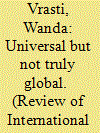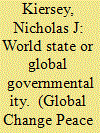|
|
|
Sort Order |
|
|
|
Items / Page
|
|
|
|
|
|
|
| Srl | Item |
| 1 |
ID:
146663


|
|
|
|
|
| Summary/Abstract |
This article presents and analyses the findings of a research project on power relations in the context of development partnerships with civil society on HIV/AIDS in Mozambique, Rwanda and South Africa, and engages in a critical dialogue with governmentality analysis. It argues that contemporary neoliberal government needs to be understood as context-specific articulations of three forms of power discussed by Foucault – sovereignty, discipline and biopower – and, in the global domain, a fourth form of power – (new) imperialism. Further, the analysis demonstrates how the introduction of a ‘package of (de-)responsibilisation’ shapes CSOs’ activities so that they become competitive service providers, use evidence-based methods and produce measurable results. Addressing the issue of resistance, it shows how the transfer of responsibilities may involve tension and struggle – a politics of responsibility.
|
|
|
|
|
|
|
|
|
|
|
|
|
|
|
|
| 2 |
ID:
143339


|
|
|
|
|
| Summary/Abstract |
This paper critically examines the discursive power of the International Criminal Court (ICC), which was established in 2002 with unprecedented jurisdiction in terms of both crimes being prosecuted and territorial scope. What evokes a critical engagement is not only the criminalization of certain acts in international law, but also the evolution of a permanent international criminal court with forms of power enabling the sanctioning, prosecution and punishment of these acts. Analysing how current international criminal law developed and is being shaped brings to the surface particular power structures embedded in legal texts and practices. By subjecting the discourse of the ICC to a Foucauldian analysis and arguing for the utility of Foucault’s concepts in analysing contemporary international criminal legal discourse, the paper contributes to our understanding of novel techniques and procedures of contemporary global governmentality, and how the ‘international community’ is constituted as both a subject and an object within this recent power modality.
|
|
|
|
|
|
|
|
|
|
|
|
|
|
|
|
| 3 |
ID:
118953


|
|
|
|
|
| Publication |
2013.
|
| Summary/Abstract |
This article responds to issues raised about global governmentality studies by Jan Selby, Jonathan Joseph, and David Chandler, especially regarding the implications of 'scaling up' a concept originally designed to describe the politics of advanced liberal societies to the international realm. In response to these charges, I argue that critics have failed to take full stock of Foucault's contribution to the study of global liberalism, which owes more to economic than political liberalism. Taking Foucault's economic liberalism seriously, that is, shifting the focus from questions of natural rights, legitimate rule, and territorial security to matters of government, population management, and human betterment reveals how liberalism operates as a universal, albeit not yet global, measure of truth, best illustrated by the workings of global capital. While a lot more translation work (both empirical and conceptual) is needed before governmentality can be convincingly extended to global politics, Foucauldian approaches promise to add a historically rich and empirically grounded dimension to IR scholarship that should not be hampered by disciplinary admonitions.
|
|
|
|
|
|
|
|
|
|
|
|
|
|
|
|
| 4 |
ID:
085720


|
|
|
|
|
| Publication |
2008.
|
| Summary/Abstract |
Abstract This article addresses recent theoretical discussion about the state under conditions of globalisation, focusing in particular on recently popular 'world state' theory, as articulated by Martin Shaw and Alexander Wendt. It suggests that while world state theory is useful to the extent that it historicises the function of the state, it can be challenged for its uncritical approach to the question of how state power is actually constituted. To make this argument, the article refers first to an emerging Marxist critique that focuses on liberal hypocrisy and the role of imperial violence in the formation of the world state. However, while this approach reveals the elision of many forms of violence in world state theory, it shares world state theory's tendency to avoid exploring the role of more constitutive forms of power. Challenging this view, the article turns to Foucault's theory of governmentality and some recent applications of it to Imperialism, Empire, and the War on Terror.
|
|
|
|
|
|
|
|
|
|
|
|
|
|
|
|
|
|
|
|
|